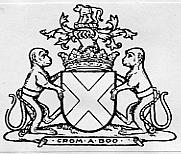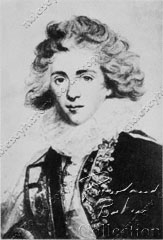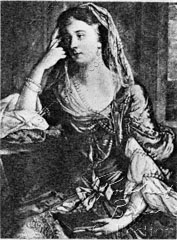| Boyle Farm - Lord Henry Fitzgerald |
Being the younger son of an extensive family Lord Henry Fitzgerald had little to hope for in the way of inheritance. Nevertheless, he had all the right upper crust connections. He was the son of the first duke of Leinster, and of royal descent, being the grandson of the duke of Richmond, who was himself the grandson of Charles the second's liaison with the French Louise de Keroualle. Like Charlotte Digby, who was as we have seen occupier of the house when it was Fords, he was descended from the earls of Kildare, and the coats of arms of both families have the same supporters - a pair of monkeys. Recalling an instance, back in the fourteenth century, when in a blazing castle one of these creatures saved the life of the child who was to become the first earl, by cradling the little boy in its arms(163).
 |
Fitzgerald coat of arms |
 |
Lord Henry Fitzgerald - As a schoolboy at Eton |
He was nine years senior to Charlotte, and had led a much more exciting and romantic life. After an education at Eton, he had joined the army, saw action in the West Indies, and had risen to the rank of lieutenant-colonel, all whilst still in his early twenties(164). On returning to this country he quit the service and joined the social round, both in London and in Dublin. Making a particular shine in the role of amateur thespian.
Acting was then all the rage among the beau-monde. After all, with plenty of time and few duties or responsibilities they had to find something to do to occupy their minds.
Fitzgerald's father had turned part of his mansion in County Kildare in Ireland into a theatre, in which he, his mother, and other relatives and friends displayed their dramatic skills(165). Then in London his cousin, the duke of Richmond, opened a private theatre at his town house just off Whitehall. Here the young, and even the not so young, all aspiring David Garricks and Sarah Siddons, gave vent to their theatrical yearnings.
The Richmond House Theatre, as it was known, excelled for the high standard of the talents displayed there. "I do not think there is a private theatre like Richmond House", wrote one critic, "for not to speak of the excellence of every individual performer, I never saw anything ludicrous on that stage, and I believe that there are very few private performances that can boast so much"(166).
In the spring of 1787 they staged a play called "False Appearances, which was an adaptation of a French piece "Les Dehors
Trompeurs", and Henry Fitzgerald was invited to join the cast, and given the role of "the marquis". He was an instant success, and soon became the company's star performer. The earl of Ailesbury confided to his diary: "Lord Henry Fitzgerald's acting was incomparable"(l67). John Kemble, reversing his usual function, was one of the audience, "and professed himself delighted with the performance, and desired to transplant the play to Drury Lane"(168).
In the following autumn the play was "The Wonder", a popular comedy by Susanna Centlivre, widow of Joseph Centlivre, the king's chief cook, who lies buried in East Molesey churchyard. Henry played the main character, "Don Felix", a gay Spanish nobleman. Having previously concentrated on tragic roles, this was his first attempt at comedy. And in a part which stretches the acting ability between extremes of tenderness and jealousy.
The critics raved. The Times said of his performance: "Of Felix, every eulogium that can be paid to good acting, is, of right, a tribute due to Lord Henry Fitzgerald. his figure, voice, and manner united in communicating a true representative of a polished gentleman. His agitations were expressed with nature, discriminated with skill, and the passion of jealousy was never more naturally portrayed" (169).
The role of Don Felix had been made famous by Garrick, who played the part sixty-five times in twenty years(170). But Henry's performance was considered comparable even to England's greatest thespian himself.
One lady, who sat in the front row of the pit in order not to miss any part of the act, writes: "Everybody that has seen Garrick thought Henry equal to him, some parts beyond him; but Henry looked much more the character of Don Felix, as he has one great advantage over Garrick, that of having a remarkably pretty figure and looking more like a gentleman, which I understand was not the case with Garrick"(171). Although this assertion may be thought to be prejudiced - the writer was his sister.
However, it was to some extent echoed by Walpole: "Lord Henry", he said, "is a prodigy, a perfection - all passion, nature and ease; you never saw so genuine a lover. Garrick was a monkey to him in Don Felix; then he is so much a man of fashion, and is so genteel. In short, when people of quality can act, they must act their own parts so much better than others can mimic them"(172). His portrait in this role was engraved in mezzotint by J. Park(173).
There was considerable competition among the various theatre groups set up by the titled nobility to put on the best plays and the most popular actors. Stars such as Lord Henry had become were eagerly sought after and often poached from other companies. In November 1790 we read that he had left the duke of Richmond's theatre and had opted for that of the duchess of Marlborough(174). The Richmond House Theatre burned down less than two years later.
Such a man as Lord Henry, handsome, dashing, and debonaire, was bound to set the female hearts afflutter. His sister, Lady Sophia Fitzgerald, boasted: "as for the ladies they left the theatre in love of him"(171). Which, again, the staid Horace Walpole re-echoed: "He has raised a thousand passions", he says(175).
No wonder that of all the suitors for Charlotte Boyle's hand and fortune it was Lord Henry Fitzgerald who won the race. He had the charm - she had the money.
Arrangements for the marriage went ahead. The jointure for the control of her estate was arranged, as was usual, by the senior members of the two families(176), and on 4 August 1791 the two were united by special licence inside Charlotte's London house, by the bishop of Peterborough. The witnesses were the duke of Richmond and the earl of Essex(177).
They settled down to life at Boyle Farm, and within a week were paid a visit by their old friend Walpole: "I went to Boyle Farm this morning", he writes, "to visit Lord Henry Fitzgerald and his bride, and carried in my coach an old Lady Clifton, her aunt"(l78).
Again the house became a centre of social life. But now it was chiefly the Fitzgerald relatives who enlivened it. "The Good Family", as they were pleased to entitle themselves, were very prodigious and very close. The old duke and duchess of Leinster had had twenty children, and at her husband's death, the duchess had engaged a dour penniless Scotsman as tutor to the younger sons, and then petrified the family by announcing that she intended to marry him. Which she did and increased her progeny by yet another three. Her fertile career of childbearing altogether spanned thirty years, it apparently did her no harm - she lived to her eighty-third year.
The duchess loved Boyle Farm and its situation, and stayed here with her son and daughter-in-law for long periods playing with her grandchildren as they came along. She was described as: "a peculiarly lovable woman to whom all her family were devoted and her good looks were undisputable" (179). She was visited here by her her sister, Lady Sarah Napier, whose husband was far away fighting in Flanders. She writes: "I passed a day with my sister Leinster at Boyle Farm, which is now the seat of luxury, & beauty, & ingenuity; it would have taken me a week to see all the fine things in the house. The grounds are enlarged and improved by the growing of trees, & the pavilions opposite are improved by the addition of trees and buildings; otherwise the natural beauty of Thames Ditton can never alter. My dear sister & her girls enjoyed it so much this hot summer. It was a delight for me to see them there" (180).
 |
Emily, duchess of Leinster Mother of Lord Henry Fitzgerald |
Another guest on that occasion was Charles James Fox, the statesman and nephew of Mrs. Charlotte Digby, who as we have already seen had visited the house over thirty years before when he was yet a boy of fourteen (181). Lady sarah describes how he: "like me was all enchantment with the place & we were trying to find old spots & old trees of our acquaintance" (180).
A regular visitor also was Lord Henry's step sister, Cecilia, to whom he lent the house for her honeymoon after her marriage to Charles Lock of Norbury Park near Leatherhead, in 1795(182). Of non-family guests, we know that Thomas Coutts, the banker, and his family stayed here(183). Perhaps it was through such visits that his daughter came to like the district and when subsequently she married the politician, Sir Francis Burdett, they made their home for a while at nearby Ember Court.
Of all the Fitzgerald family, perhaps it was Lord Henry's sister Sophia who was closest to him. It was she who had been so eulogistic of his acting ability. She never married, and devoted herself to the service of the family. She settled in a house called "The Rushett" in Thorkhill Road just to be near her brother(184), and in 1799 purchased "The Lodge" in Watts Road to be even closer(185). The lease of "The Rushett", described as "lately in the occupation of Lady Sophia Fitzgerald", was then put of the rnarket(186). The house still exists although it is now known as "Old Manor House".
Lady Sophia continued to occupy "The Lodge" until her death in 1845, when she was buried in Thames Ditton church yard(187). Here she befriended and brought up two of her orphaned nieces.
She was considered the ugly ducking of the Fitzgeralds, most of whom were thought to be rather good looking. Described as "a small, fat, fair woman, very plain, but with a sweet countenance, fond of reading, work, gardening, excellent health as she grew up, an immense walker, used to walk four or five miles every day, very affectionate and sensitive" (188). But another of her brothers, Edward, always maintained that "there was more good in her little finger than all of the family put together"(189).
In 1798 Charlotte Fitzgerald, Lord Henry's wife, met Fanny Burney, whom she had not seen since she was the fourteen-year-old Miss Boyle when, as we have seen, Fanny had a great friendship with her mother(190). However, a certain coolness seems to have developed between the two. Mrs Boyle Walsingham had written to Fanny from Boyle Farm on 18 September 1786: "I was very glad to receive a letter from you, but rather frightened at the formality of it, pray write to me in a more friendly & familiar style, to remind me of the pleasant days I have enjoyed in your society here, which tho' I am afraid (from your situation) can never return, I shall never cease to regret"(191). Just what this situation was it is not clear, and although she went on to say "If any lucky accident should bring you within reach of this place, I hope you will give me the pleasure of seeing you", apparently Fanny had never visited Boyle Farm again.
Nevertheless, after all this time Fanny met again with the daughter, and has this to say of her: "She adores her husband, Lord Henry, who was her decided choice, & with whom she has lived in uninterrupted harmony since their union. She has several little children, & brings them up, and nurses & teaches them all herself. She is one of the fondest of mothers as well as wives"(192).
Although Henry and Charlotte loved Boyle Farm, they were also enraptured with Italy, where they usually spent the winter. "The beauty of the Italian scenery made an irresistible appeal to Lady Henry's artistic sense; and she passed long hours painting the views and visiting the palaces, churches, and operas. Lord Henry, too, had a dilettante love of the arts, though his forte lay in acting rather than in the fine arts"(193).
Henry was also fond of walking. Of the Lake of Guarda he says:"One mountain of an immense height stands almost single upon its border, and on its top I could see a small church and a cluster of little houses, embosomed in evergreen wood. To this mountain my ambition climbed. Rugged and weary was the path; and as I stopped to breathe, I felt the lake with all its beauties become under the dominion of my eye, and by degrees I could look down upon this scene, as upon a map. At the top I found a surface about the size of my field at Boyle Farm, laid out with gardens, and to each garden a house. These were twelve in number, and they were not only retired from the world, but half-way up to Heaven"(193).
It was in Italy that the Fitzgerald's first child, a son whom they named after his father, was born. Lady Holland reported: "At Verona we found Lord and Lady Fitzgerald; she was suddenly brought to bed there"(194).
Six years later, back in England, the same lady wrote in her diary: "1799. 3 July. On Wednesday went to Boyle Farm to stay the day for the christening of Lord Henry's youngest son. Lord Holland is his godfather, he is christened Edward"(195). Unfortunately this lad died when he was only eleven years old. Altogether twelve children were produced in steady rotation, of whom eight were born in Thames Ditton, and were taken across the road to be baptized in the font at the church of St. Nicholas(196).
In 1798 a great sadness settled upon the family and Boyle Farm. The Fitzgeralds were deeply involved in Irish politics. Their ancestors had settled in County Kildare in the twelfth century, and had come to dominate the country like princes. But unlike most of the autocratic overlords in that island, had mixed and intermarried with the locals, had adopted their language and traditions, and had been accepted as true Irishmen. (Perhaps if more others had done likewise that poor unhappy country would not be seeing the divisive troubles which so beset it today). Henry Fitzgerald's aunt, Lady Sarah Bunbury, wrote with much sorrow: "lt is not possible to live in this country without perpetually feeling distress on account of the greatest number of its inhabitants which are poor - the most part without exaggeration have a bare existence"(l96).
The pre-eminence of the family in Irish affairs is manifested by the fact that when Lord Henry's father had been made duke of Leinster he was the first duke ever created in the Irish peerage(197). But although he lived almost like an uncrowned king in his mansions at Carton in the province of Leinster and Lildare House (now the Parliament House) in Dublin, yet he was the leader of the Irish Patriotic Party, and he and his family spoke out at the conditions of the poor peasantry and the iniquities of the administration.
This love of the Emerald Isle was embedded in all the Fitzgeralds. Lord henry had been elected a member of Parliament for the City of Dublin even before his marriage and his settling down at Boyle Farm. But it was his youngest brother, Edward, whose fanaticism, whose heorism, and whose eventual death for the cause of Irish freedom, has, even in a country noted for its martyrs, earned for him the reputation of Erin's greatest patriot.
The story of Lord Edward's exploits, of his marriage to the beautiful Lady Pamela (supposedly the daughter of the duke of Orleans and Madame de Genlis), of his attempt to raise an Irish insurrection, of his death in prison after being wounded by an English soldier, and of Pamela's exile, her death in Paris, and the subsequent re-interment of her remains in Thames Ditton churchyard, has been told detail by detail many times(198). It is not, therefore, intended to repeat it here, except to say that Lord Henry, who idolised his brother, was in the cell when Lord Edward, crying "Dear Ireland, I die for you", breathed his last.
The family was grief-stricken, and when Fanny Burney saw Charlotte six months later she was still wearing double mourning(192). The old duchess of Leinster, now in her sixty- ninth year, came to stay at Boyle Farm again. Here she recovered her old composure, and from here in the following summer she wrote: "I am quite well again in health and enjoying as much comfort as I can ever hope to do again in this world. We are out of doors all day long with all the sweet children about us. The place, the Flowers, the Birds, are all enchanting and have a wonderful effect, a blessing from Heaven not to be overlooked(199). George Selwyn said of her: "She was beautiful in her person, and was no less beloved in her youth than respected in old age"(200).
All books copyright © R G M Baker, all rights reserved.
Images © 2006 M J Baker and S A Baker, all rights reserved.
Web page design © 2006 M J Baker and S A Baker, all rights reserved.